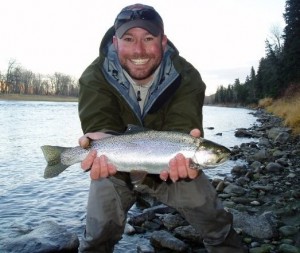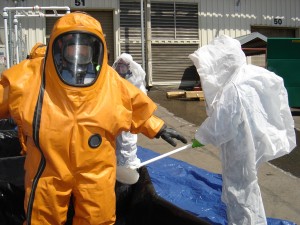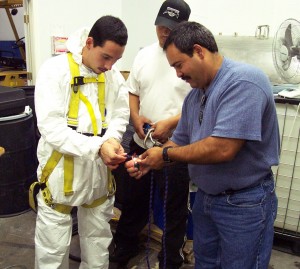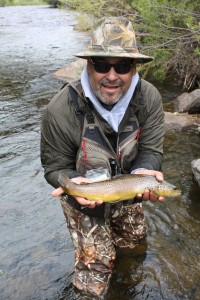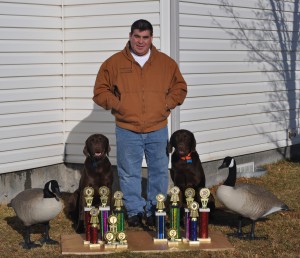Environmental Consultant, Environmental Manager, Environmental Specialist, Environmentalist, they’re all titles that don’t really describe the work and life of an environmental professional. Unfortunately those of us working in this field have all probably been called one of them more than once. Eric Johnson is all of those things, but he’s also an Environmental Scientist, which I think is a great title and descriptor for Eric and the work he’s doing.
I’ve worked with Eric for a few years and caught up with him over the phone to talk about his work and life as an environmental professional. He has worked in environmental labs, at a treatment, storage, and disposal facility (TSDF), consulted with the government, and solved a lot of environmental problems for people who needed his help. Eric currently works as an environmental consultant in Chicago, IL as an Area Environmental Protection Specialist, but let’s just say he does environmental science. Eric also writes about Indiana University hoops for Inside Indiana magazine.
TNEP: Tell me what drew you to this field?
Eric: I was thinking of going into more of a wildlife biologist career path, when I took a CERCLA class. One semester just on CERCLA. The instructor for the class was working for the EPA out of Region V, so there was a lot of real world experience, real world stuff. That’s kind of when I got into the hard side of the environmental science; looking at the nastier stuff. Actually identifying these chemicals and cleaning them up. It really drew me in. Especially growing up in northwest Indiana, which environmentally was kind of a pit. It hit me that, “Hey there’s regulations out there that, 1. stop these things from happening, and 2. work on cleaning up these areas that were torn apart by industry over the years.” Seeing that it would apply to stuff that I grew up with, it kind of hooked me.
TNEP: Was there a moment or a person you worked with when you realize this was good, interesting work?
Eric: There’s a couple of points there. The first one is the instructor I mentioned. The stories and lectures were very interesting. This probably makes me sound like a geek, but it was a 3 hour class and I sat on the edge of my seat because it had my attention.
Then getting to work at a TSDF. I moved up to compliance manager of the lab. If we thought there was a better way to treat the materials, environmentally preferred as well as being a cost centered decision, we’d write that into the permit. it was interesting process to see the sausage making of the permit.
Moving forward, working with the US Army Reserve, I certainly don’t work with the environmentally complex problems, but there are so many facilities to manage at once. The nice thing now is that you are given enough space to do what we want to be as environmentally proactive as we want.
TNEP: Tell me about your interaction with people who aren’t environmental professionals.
Eric: First off, it seems people who aren’t environmental professional have no idea what we do. Even my own wife for years didn’t understand what I did. It’s funny, I’ve been doing it so long that we speak our own language. When you talk to other people, the first thing you get is, “Oh, you’re an environmentalist.” I don’t necessarily like the word environmentalist. I’m more of an environmental scientist. I think of the term environmentalist as more like a casual activist. That’s why I always try to clarify that I’m an environmental scientist. My skin crawls anytime someone uses the term, environmentalist. It makes us sound like we’re a toad in the road of progress. Everyone thinks my job is to protect endangered species. Technically speaking it is part of my current duties, but it’s a very small part. The other part is that people think you’re a garbage man. I’ll tell people I handle hazardous waste and their reaction is, “Oh, you’re a garbage man.”
My wife teaches 4th grade and every year I do an environmental talk for the class. Every year they start asking me what I do, but it always ends up the same way. The first year I did it, it was right after Al Gore’s, Inconvenient Truth. There was a girl in class who saw the video and asked a question about the polar bears. I answered with the basics about global warming and ice melts, etc. After one polar bear question, it turned into, “Bear Talk with Eric Johnson.” How long does it take a polar bear to drown? 5 minutes of straight polar bear questions. My wife says to her class, “No more polar bear questions.” One kid raises his hand, “How long does it take a panda bear to drown.” It’s like, “You’re an environmental guy so that makes you a bear expert.”
Maybe it’s because its a relative new field that people don’t understand what we do. That’s what environmental professionals need, a reality show.
TNEP: Following up on that story with your wife. How has a career as an environmental professional influence your life and your lifestyle?
Eric: It’s had a big influence. I remember when my grandmother was still alive, one day she calls me up. She’s reading the back of her tube of toothpaste and wanting to know if any of these chemicals would cause her gums to be sore. If there’s something with environmental borne pollutants that are causing problems, people will ask me about that.
TNEP: I know you’re a big fisherman. I can imagine it’s played a big part in that.
Eric: Sure, practicing catch and release, joining organizations such as Trout Unlimited, I’ve written for magazines, fishing magazines, environmental stuff that affects water quality. (Eric has written for a Tight Loop, an e-zine about fly fishing in the Midwest.)
One thing I’ve been active with is Pebble Mine in Alaska. They want to put the worlds largest gold and copper mine in a very sensitive spot in Alaska in the Bristol Bay region. It’s one of the last strongholds for the wild salmon. I’ve been active in writing my congressman and the EPA to make sure that area is protected. This is one of the last untouched areas. If there was a good enough reason to put the mine in that area, such as money for the state, but commercial fishing in Alaska is huge. If you’re talking money wise, long term it’s gonna be a push. There’s so many outdoor groups that have signed on to this. One of the companies leading the charge right now is Patagonia. Yvon Chouinard is really fighting it. Also companies like Cabela’s, Orvis, and Sage. There’s a lot of people lined up.
TNEP: Is there anything that you’ve seen that has improved and is there anything that you see is still lacking and needs development?
Eric: I came on in the mid-90’s. It was the beginning of consolidation of the companies that were out there. There were so many people who were hanging a shingle up and now they’re the environmental guy. Consolidation was good because it got rid of a lot of the shadier side of environmental companies. The industry grew up and became a little bit more serious, a little bit more professional.
We’ve almost gone too far with consolidation. There’s fewer and fewer companies out there and what’s been sacrificed is there aren’t really too many niche companies. For example, wetlands delineation. There were companies and that’s what they did. Now you have to go to a larger corporation to do that and they’re looking for big jobs. So small jobs don’t get looked at and don’t necessarily get coveted. They don’t want a wetlands delineation job for 2 1/2 acres. They want a massive site or a hundred small sites.
Even in the early 2000’s there were a lot of companies out there that you’d call to do the work and when they’d arrive on site you’d look at them like, “I don’t think you can do this work. I don’t think you understand what it takes to do this work.” You’d get a company show up to do confined space entry work and they’d bring a full-face respirator and a section of rope. Even the mentality. There’s nothing wrong with having a good time, but I think early on the environmental companies out there were more interested in having a good time than they were than actually accomplishing the task.
It was nice to do this because it got me reevaluating the past 20 years. This is really cool, because this is a good way to set up the environmental fraternity. It still is a very specialized field and it’s not like there’s a whole lot of us out there.
TNEP: “Environmental fraternity”? I like that. Thanks, Eric.

